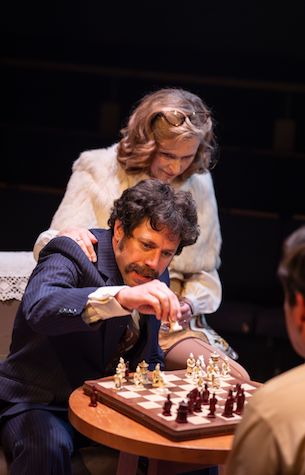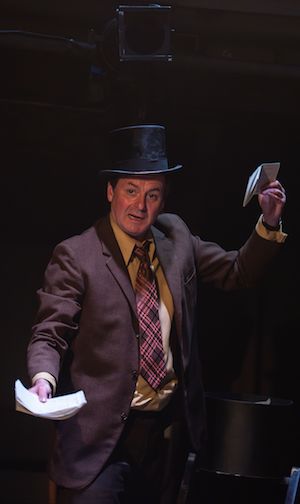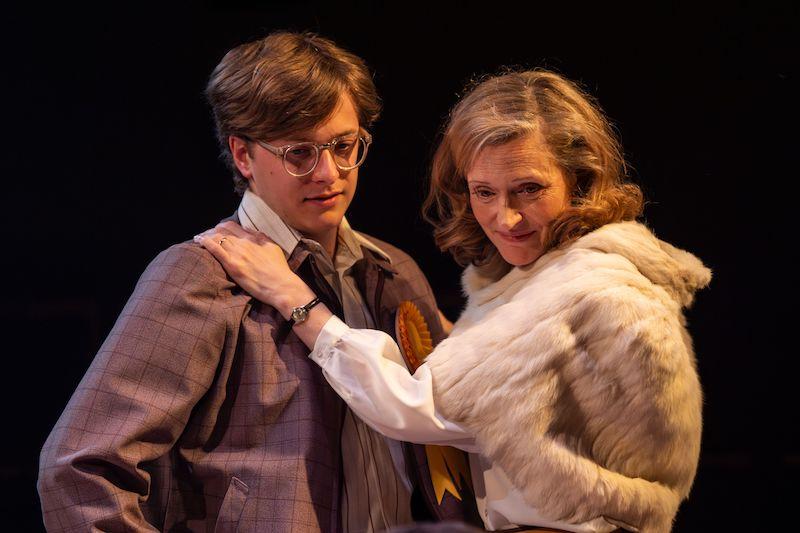Terence Rattigan's rehabilitation – some might almost say deification – as a leading 20th century playwright is complete. As well as academic studies, biographies and numerous highly respected revivals of his work, there is a growing clamour to accord him the ultimate, deserved, honour: a theatre bearing his name.
The latest production of The Deep Blue Sea, starring Tamsin Greig and receiving plaudits in the West End, is just the most recent revival in the ongoing reappraisal of Rattigan's work elsewhere. The Orange Tree has already played a part in this, with productions of French Without Tears and While the Sun Shines.
 Considered unfashionable in the wake of the theatrical and cultural revolution beginning with Look Back in Anger in 1956, his work was either ignored or dismissed as irrelevant for some years, and he turned to writing screenplays. After Lydia, however, the more substantial part of a double bill under the title of In Praise of Love, first staged in 1973, was generally well received. The accompanying farce, Before Dawn, was soon dropped and After Lydia extended and presented under the original overall title. This was the beginning of a change in Rattigan's theatrical fortunes.
Considered unfashionable in the wake of the theatrical and cultural revolution beginning with Look Back in Anger in 1956, his work was either ignored or dismissed as irrelevant for some years, and he turned to writing screenplays. After Lydia, however, the more substantial part of a double bill under the title of In Praise of Love, first staged in 1973, was generally well received. The accompanying farce, Before Dawn, was soon dropped and After Lydia extended and presented under the original overall title. This was the beginning of a change in Rattigan's theatrical fortunes.
The intimate, in-the-round space of the Orange Tree in Peter Butler's spare design is an effective background to Amelia Sears' direction: Lydia, her literary critic husband Sebastian, their friend Mark, a wildly successful popular novelist, and their aspiring playwright son, Joey, circle each other in varying degrees of misunderstanding. Lydia, an Estonian refugee after the war, has been diagnosed with a terminal illness, the result of malnutrition during the privations of her existence under both Nazis and Communists. She has gone to great lengths, using skills learned during her time in the Resistance – rifling unnoticed through papers, memorising figures, doctoring medical reports – to conceal this from her husband. He, meanwhile, has discovered the truth and is hiding his knowledge from her. Both confide separately in Mark.
 Disappointed never to have repeated his early novelistic success, Sebastian has taken refuge in judging the work of others. His claims to be a Marxist seem so laughable that he is perhaps merely enjoying inventing a caricature, a role to play. Accustomed to getting his own way, he is often boorish and self-absorbed. The irony is that, in order to hide his anxiety about Lydia and to go along with her desire to hoodwink him, he makes a point of not softening his behaviour towards her. As Sebastian, Dominic Rowan (pictured right) – to begin with louder in his delivery than the small space requires – seems more at home dishing out clever observations and cutting putdowns than – at last – admitting emotional vulnerability. There is, though, plenty of well-timed dark humour in his performance, and he does hit the mark when he breaks down, his face crumpling, as he tells Mark the truth.
Disappointed never to have repeated his early novelistic success, Sebastian has taken refuge in judging the work of others. His claims to be a Marxist seem so laughable that he is perhaps merely enjoying inventing a caricature, a role to play. Accustomed to getting his own way, he is often boorish and self-absorbed. The irony is that, in order to hide his anxiety about Lydia and to go along with her desire to hoodwink him, he makes a point of not softening his behaviour towards her. As Sebastian, Dominic Rowan (pictured right) – to begin with louder in his delivery than the small space requires – seems more at home dishing out clever observations and cutting putdowns than – at last – admitting emotional vulnerability. There is, though, plenty of well-timed dark humour in his performance, and he does hit the mark when he breaks down, his face crumpling, as he tells Mark the truth.
Claire Price shines as warm, elegant Lydia. She has a touching inner strength, a determined love of life as well as people, as if she carries daily the horrors of her early years along with continuing gratitude for her escape from them. It is a beautiful performance.
Daniel Abelson's Mark (pictured above, left with Claire Price), sporting a genuine '70s droopy moustache, is a generous sounding board for Lydia and Sebastian, both of whom he loves. Joe Edgar is just right as Joey, the idealistic Liberal Party campaigner at odds with his tetchy, posturing father.
Rattigan's work often reflected aspects of his own life. Flare Path, for instance, drew on his wartime experience in the RAF. His lover Kenneth Morgan's suicide fed into The Deep Blue Sea, which opens with Hester's suicide attempt. In Praise of Love was suggested by the actor Rex Harrison's concealment of her terminal illness from his wife Kay Kendall and his apparently unsympathetic treatment of her, which Rattigan observed in 1957. By the time he came to write the play, years later, he had himself been diagnosed with terminal leukaemia. He died a few years later, in 1977.
Biographers have pointed out that all the three male characters of In Praise of Love could represent snapshots of Rattigan himself at different stages of his career: the aspiring young dramatist in a difficult relationship with his father, the acclaimed writer and the one now out-of-fashion.
In an interview in 1973 Rattigan said he thought the last three lines of this play were the best he had ever written. Hurrying Joey to make a chess move as Lydia leaves the room, Sebastian says:
"We haven't got all night ahead of us"
Lydia disappears
"Except I suppose we have".
There are many strengths to this production, often given a haunting quality by the Estonian-inspired soundscape. The complexities of the relationships, the mix of brutal comedy and sadness are there, but it doesn't quite deliver the emotional punch which would make Rattigan's opinion of those last lines ring true.















Add comment